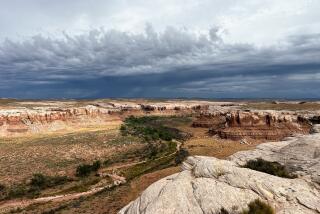Mining for trouble
- Share via
A PAIR OF DAMAGING environmental proposals have been stripped out of the budget bill before Congress. Thanks to bipartisan opposition, no new oil drilling will be allowed off the nation’s coasts or in the Arctic National Wildlife Refuge.
Yet an equally troubling provision remains in the bill, placed there by Rep. Richard W. Pombo (R-Tracy), who as head of the House Resources Committee has pushed an extraordinary number of wilderness-trashing ideas this year. This one would allow the government to sell off millions of acres of public land for mining, for as little as $1,000 an acre. The deal comes complete with mineral rights, which are generally worth far more than the land.
Buyers would not need to prove there are minerals in the ground, and the owners have no obligation to try to find them if there are. They could decide to develop the land into a housing development or an office complex, or they could just keep the land for themselves, no public trespassers allowed. The deal includes land in national forests; it also would open up old claims in national parks to mining. These are lands now used for hiking, camping and off-roading -- and held by the public for its future. Prospective buyers would need to invest only $7,500 in land surveying or other “mineral development work” to turn these into private lands. Where do we all sign up for a deal this rich, at our own expense?
There’s little in this for the budget -- or the public. The budget would gain a minimal, one-time boost with each sale, and would suffer the permanent loss of public resources sold at rock-bottom prices.
The budget bill squeaked by the House late Thursday, with this measure attached. It will be up to the Senate-House conference committee to halt the attempted giveaway of public treasures. If that fails, the best recourse would probably be to contribute to groups such as the Nature Conservancy, in the hopes that they will buy up large blocks of land to hold in the public interest. Should that day come, it will sadly mean that public land is safer in the hands of a private organization than in the possession of the government.
More to Read
Sign up for Essential California
The most important California stories and recommendations in your inbox every morning.
You may occasionally receive promotional content from the Los Angeles Times.









